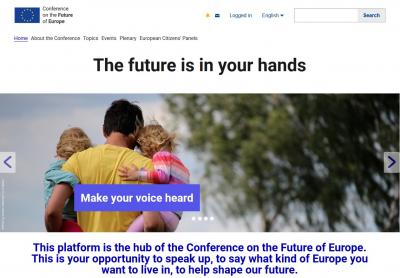Contact
DG COMM
Main Organisation
Other Organisations
European Parliament
Council of the European Union
Description
The Conference on the Future of Europe is a bottom-up, pan-European initiative composed of multiple interlinked events and debates where citizens, civil society and all other stakeholders (including local, regional and national authorities) from Europe are able to share and discuss their ideas, in all official EU languages, on what they expect from the European Union.
The Conference is placed under the authority of the 3 institutions (Joint Presidency) and it has has four main components:
- The multilingual digital platform (https://futureu.europa.eu/) is the Conference’s central hub and a first at the pan-European level in terms of scale, interactivity and multilingualism. Through the digital platform, citizens, civil society and all other stakeholders can share their ideas on the issues that concern them, comment on other people’s ideas and organise events (virtual and, when possible, in-person and hybrid).
- Decentralised events in a wide variety of formats organised by the Institutions, Member States or third parties (e.g., local authorities, organised civil society, citizens) under the umbrella of the Conference. The outcomes of the events are posted on the Conference’s digital platform.
- Four thematic European Citizens’ Panels organised by the EU Institutions. Each panels will be composed of 200 randomly selected citizens, representative of the EU population in terms of geographic origin, gender, age, socioeconomic background and level of education.
- Conference Plenaries, composed of representatives from the European Parliament, the Council and the European Commission, as well as representatives from all national Parliaments, and citizens. The plenaries will ensure that the recommendations from the European citizens’ panels are debated without a predetermined outcome, also considering the results of the decentralised events.
The Conference is more than a mere listening exercise. The European Parliament, the Council and the Commission have committed to following up on the Conference’s outcomes.
Participation Spectrum
When and Where
Start Year
2021
End Year
2022
Policy Context
Science or Policy Field
Specific Topic
The Conference on the Future of Europe was framed around 9 main topics, plus one for cross-cutting issues:
1) Climate change and environment;
2) Health;
3) A stronger economy, social justice and jobs;
4) EU in the world;
5) Values and rights, rule of law, security;
6) Digital transformation;
7) European democracy;
8) Migration;
9) Education, Culture, Youth and Sport;
10) Other ideas.
1) Climate change and environment;
2) Health;
3) A stronger economy, social justice and jobs;
4) EU in the world;
5) Values and rights, rule of law, security;
6) Digital transformation;
7) European democracy;
8) Migration;
9) Education, Culture, Youth and Sport;
10) Other ideas.
Participants
Participants
775075
Who was involved
Communities or representatives involved
Participation was open to all EU citizens
How were the Participants selected?
Through what means citizens knew about the call for participation?
The Conference was advertised on social media, and had several high level events.
Methodologies
Events
6661
Methodologies used
Tools Used
Spaces Used
Impact
Output
Main Outcomes and Lasting Achievement
The report on the final outcome of the Conference on the Future of Europe was presented to the Presidents of the three institutions on 9 May 2022. It included 49 proposals and more than 300 measure for action.
The report is available here: https://futureu.europa.eu/pages/reporting
The report is available here: https://futureu.europa.eu/pages/reporting
How were the outcome taken up within the process they were carried out?
The three Institutions are now examining how to follow up effectively on the final report, each within the framework of their competences and in accordance with the Treaties. A feedback event is planned to take place in autumn 2022 to update the citizens on the Institutions' response and their commitment.
Feedback provided
Assessment
Lessons Learn
1) The Conference was an immense challenge: it was the first time that a transnational, multilingual and interinstitutional exercise of deliberative democracy was organised, involving thousands of European citizens as well as political actors, social partners, civil society representatives and key stakeholders. It has also proven its historical relevance and importance in the context of the COVID-19 pandemic and the Russian aggression of Ukraine.
2) The Conference’s multilingual digital platform had a central role in the entire process: it served as the main hub of the Conference, allowing everyone to participate in the Conference – all citizens across the EU and beyond, as well as civil society, social partners. In addition, it played a fundamental role in the transparency of the overall process and the access to information. Overall, the platform provided an innovative deliberative space, which allowed many thousands of citizens and various stakeholders from all over Europe and beyond to engage in a multilingual online debate across Member States on European issues. It therefore proved itself to be valuable tool of deliberative democracy at EU level.
2) The Conference’s multilingual digital platform had a central role in the entire process: it served as the main hub of the Conference, allowing everyone to participate in the Conference – all citizens across the EU and beyond, as well as civil society, social partners. In addition, it played a fundamental role in the transparency of the overall process and the access to information. Overall, the platform provided an innovative deliberative space, which allowed many thousands of citizens and various stakeholders from all over Europe and beyond to engage in a multilingual online debate across Member States on European issues. It therefore proved itself to be valuable tool of deliberative democracy at EU level.
Recommendation
- Citizens need to be given time and space to deliberate on the issues that affect them.
